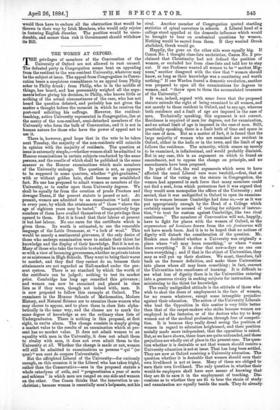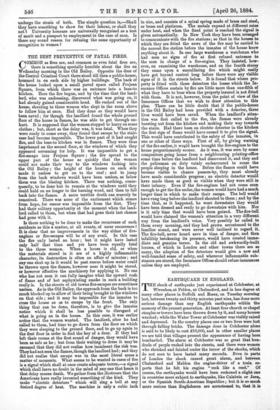THE WOMEN AT OXFORD.
THE privileges of members of the Convocation of the University of Oxford are not allowed to rust unused. The defeated party in Congregation seems bent on appealing
from the resident to the non-resident University, whatever may be the subject at issue. The appeal from Congregation to Convo- cation bears a suspicious resemblance to an appeal from Philip sober to Philip drunk ; from Philip, who is in the middle of things, has heard, and has presumably weighed all the argu- ments before giving his decision, to Philip, who knows little or nothing of the actual circumstances of the case, who has not heard the question debated, and probably has not given the matter a thought before the moment in which he receives the post-card soliciting his suffrage. However, the resident- teaching, active University represented in Congregation, lies at the mercy of the non-resident, semi-detached members of the University who form the bulk of Convocation, and it is not in human nature for those who have the power of appeal not to use it.
There is, however, good hope that in the vote to be taken next Tuesday, the majority of the non-residents will coincide in opinion with the majority of residents. The question at issue is extremely simple,—whether women shall be admitted to Honour examinations in certain subjects conducted by the same persons; and the results of which shall be published in the same manner as the Honour examinations which male members of the University undergo. The question is not, as appears to be supposed in some quarters, whether " girl-graduates," with or without golden hair, shall become an established fact. No one has proposed to admit women as members of the University, or to confer upon them University degrees. We shall be equally far from the creation of prude Proctors and dowager Deans, if the present statute is passed or not. At present, women are admitted to an examination " held once in every year, by which the attainments of " those " above the age of eighteen years may be tested." Comparatively large numbers of them have availed themselves of the privilege thus opened to them. But it is found that their labour at present is but lost labour. No one cares for the certificate which is given them. Its worth is estimated, to use the venerable language of the Latin Grammar, at " a lock of wool." This would be merely a sentimental grievance, if the only desire of those who undergo examination were to satiate their thirst for knowledge and the display of their knowledge. But it is not so. Many of those who take the trouble to study and be examined do so with a view of becoming govemesses, whether as private tutors or as mistresses in High Schools. They want to bring their wares to market, and they find they cannot do so, because their attainments are not regarded as Hall-marked under the pre- sent system. There is no standard by which the worth of the certificate can be judged; nothing to test its market price. Cambridge has long ago remedied this grievance ; and women can now be examined and placed in class lists as if they were, though not indeed with, men. It is now proposed to follow this example at Oxford. The examiners in the Honour Schools of Mathematics, Modern History, and Natural Science are to examine those women who may choose to appear, and to place them in class lists alpha- betically in the same way, and the classes are to mark the same degree of knowledge as are the ordinary class lists of Undergraduates. There is nothing in this proposal, at first sight, to excite alarm. The change consists in simply giving a market value to the results of an examination which at pre- sent has no market value. It does not admit women to an equality with men in the University, it does not admit them to rivalry with men, it does not even admit them to the University at all. Whether the change is made or not, women will still be admitted to examinations as persons " qui " (or gum)" non aunt de corpore Universitatis."
But the affrighted Liberal of the University—for curiously enough, on this occasion it is the Liberal who has taken fright, rather than the Conservative—sees in the proposed statute a whole cataclysm of evils, and " prognosticates a year of sects and schisms " in which men are ranged on one side and women on the other. One Canon thinks that the innovation is un- christian ; because woman is essentially man's helpmate, not his rival. Another member of Congregation quoted startling statistics of spinal curvature in schools. A Liberal head of a college stood appalled at the domestic influence which would be brought to bear on academical questions by women. Nothing would be sacred from them. If they wanted Greek abolished, Greek would go.
Happily, the guns on the other side were equally big. If Canon No. 1 thought class-lists unchristian, Canon No. 2 pro- claimed that Christianity had not defined the position of woman, or excluded her from class-lists and told her to stay out. If one Professor wanted all women to be " modest Mig- nons," another disagreed with the view that " women should know, as long as their knowledge was a smattering and worth nothing." If one Warden feared a domestic revolution, another was prepared to open all the examinations for degrees to women, and " throw open to them the accumulated treasures of the University."
It was, indeed, argued with some force that the proposed statute extends the right of being examined to all women, and not merely to those resident in Oxford, and to any age, whereas both residence and a limit of age are imposed in the case of men. Technically speaking, this argument is not correct.
Residence is required of men for degrees, not for examination, and no actual limit of age is imposed in the case of men. Still, practically speaking, there is a limit both of time and space in the case of men. But as a matter of fact, it is found that the large majority of women who are examined are resident in Oxford, either in the halls or in the town, and the limit of age follows the residence. The minority, which comes up merely to be examined, is infinitesimal, and would probably diminish. But in any case, this is an argument on which to found an amendment, not to oppose the change on principle, and no amendments have been proposed.
In point of fact, the real arguments which seem to have affected the usual Liberal vote were twofold,—first, that at the time of the voting on the statute in Congregation, the women had appeared in such force that many members could not find a seat, from which portentous fact it was argued that they would soon monopolise the offices of the University ; and second, that it was undignified in Oxford to open its examina- tions to women because Cambridge had done so,—or as it was put appropriately enough by the Head of a College which certainly cannot be accused of touting for subjects of instruc- tion, " to tout for custom against Cambridge, like two rival omnibuses." The members of Convocation will not, happily, have to fight for places with the women of Oxford, so the argumentum ad hominem drawn from the vis feminarum will not have much force. And it is to be hoped that no notions of dignity will disturb the consideration of the question. Mr. Ruskin once doubted whether a University was originally a place where " all may learn something," or where " some learn everything." It is clear that now-a-days no one can learn everything ; and if that is the object of Universities, they may as well put up their shutters. We must, therefore, fall back on the former definition, and make these Universities into places where all may learn something ; in fact, convert the Universities into omnibuses of learning. It is difficult to see what loss of dignity there is in the Universities entering into a generous rivalry in seeking subjects for instruction, and ministering to the thirst for knowledge. The really undignified attitude is the attitude of those who wish to shut the doors of employment in the face of women, for no reason whatever, except some intangible prejudice against their education. The action of the University Liberals who lead the Opposition in this matter is very little better than that of the carpet-makers who strike because women are employed in the factories, or of the doctors who try to keep women out of the medical profession, through fear of competi- tion. It is because they really dread seeing the position of women in regard to education heightened, and their position socially made more independent, that the opposition is raised. But, as we have shown, these fears are quite unfounded, and these prejudices are wholly out of place in the present case. The ques- tion whether it is desirable or not that women should receive a University education is not at issue. That has long been settled. They are now at Oxford receiving a University education. The question whether it is desirable that women should earn their own livelihood is not at issue. Many of them are obliged to earn their own livelihood. The only question is, whether their would-be employers shall have sure means of knowing that they are fit to earn it in the employment of teaching. Dis- cussions as to whether they are fit to bear the strain of study and examination are equally beside the mark. They do already,
undergo the strain of both. The simple question is,—Shall they have something to show for their labour, or shall they not University honours are universally recognised as a test of merit and a passport to employment in the case of men. Is there any sound reason for refusing the same opportunity of recognition to women ?



































 Previous page
Previous page